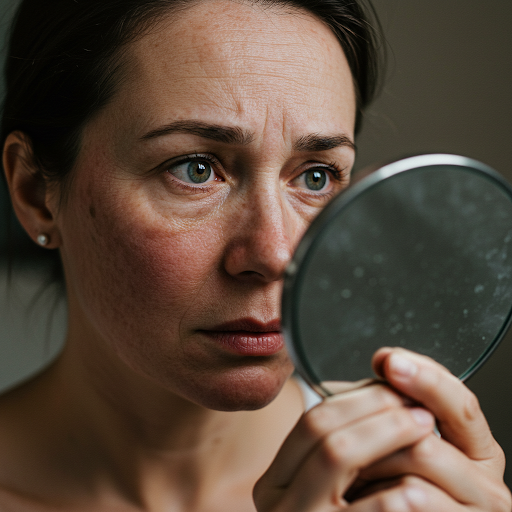What’s Really Causing Your Hyperpigmentation? The Inflammation Connection 🔥🌿
You look in the mirror and see them again—those stubborn dark patches. Maybe they showed up after pregnancy. Maybe after a summer in the sun. Or maybe they started with a single pimple that left a mark long after it healed.
You’ve likely asked yourself, “Why is this happening to my skin?”
Here’s a truth that’s rarely talked about: inflammation is at the root of nearly all types of hyperpigmentation.
Once you understand that, everything starts to make sense.

🔥 Inflammation: The Root Cause
Whether it’s triggered by sun exposure, hormonal changes, or breakouts, inflammation is the common thread behind most hyperpigmentation stories.
Inflammation is your body’s natural response to stress or injury. But when it happens in the skin, it can overstimulate melanocytes – the cells that produce pigment – leading to uneven melanin production and dark patches that linger.
☀️ Sun Exposure = Inflammation
Yes, the sun is a major player—but not just because of UV rays.
UV radiation causes inflammation in the skin, which then activates melanin production as a protective mechanism. If your skin is already sensitive or reactive, the result is patchy pigmentation that doesn’t fade easily.
Also, the sun will darken any pale spot you have, so sun protection is a must in treating hyperpigmentation.
🌿 Pro tip: Sunscreen isn’t just for sunburn – it’s anti-inflammatory support for your skin. Choose Zinc oxide – what’s good for diaper rash, can’t harm you.
🤰 Hormones Fuel the Fire
Hormonal shifts – like those after pregnancy or from birth control—don’t directly cause pigmentation. They make your skin more sensitive to inflammation.
That’s why melasma, often called the “pregnancy mask,” appears or worsens during times of hormonal change. Hormones prime the skin to overreact, and that overreaction? It’s inflammation.
That being said, many women will get pregnant and won’t get hyperpigmentation. This is your body’s way to deal with inflammation. Other women may get other diseases, so, in a way, you can consider yourself lucky.
🧬 Genetics: Your Inflammation Blueprint
If hyperpigmentation runs in your family, what you’ve inherited isn’t just melanin behavior—it’s how your body responds to inflammation.
Some people tan. Others, like you, develop dark spots. That’s not bad skin. That’s inflammatory sensitivity written into your DNA.
In our modern world, we are all inflamed. It takes very strict nutrition to get rid of inflammation in the body. Inflammation can cause Cancer, heart diseases, and so on. So again, it’s only hyperpigmentation, not even a real disease. So you’re lucky, see the bright side!
🚨 Post-Inflammatory Hyperpigmentation (PIH)
This one says it right in the name: post-inflammation.
Any trauma or irritation—no matter how small—can lead to discoloration. Common causes:
- Acne breakouts
- Harsh skincare ingredients
- Peels and lasers
- Heat and friction (including masks and waxing)
- Medications or allergic reactions
- Cosmetic products
If your skin is heated, scrubbed, or treated with acids or harsh chemicals, it’s inflaming. And if you’re prone to hyperpigmentation, that inflammation leaves a mark.
🧩 It’s All Inflammation, Just Different Triggers
Sun. Hormones. Acne. Harsh products. They all seem like different causes, but they share one common outcome: inflamed skin.
Some people tan smoothly. Others get uneven pigment from even mild sun. That’s the inflammation difference.
So the question isn’t just what caused your hyperpigmentation—it’s how to reduce of the inflammation.
💭 My Take: Calm the Fire to Heal the Skin
Inflammation is behind many modern health conditions—heart disease, autoimmune disorders, and even skin aging. Why wouldn’t it play a central role in hyperpigmentation?
🌸 I believe the key is calming inflammation.
That’s why I created Beauty Fields Hyperpigmentation Soap & Cream. They’re designed to work gently with your skin, not against it.
🌿 What Can You Do About It?
✨ Treat inflammation, not just pigment.
Avoid harsh treatments that promise fast results but inflame your skin in the process. What your skin needs is calm, support, and protection.
At Beauty Fields, our products are:
- ✅ 100% natural and handmade in New Zealand
- ✅ Free from bleach, hydroquinone, or harsh chemicals
- ✅ Designed for sensitive, pigmentation-prone skin
- ✅ Safe for daily, long-term use
💚 When combined with proper sun protection, they create a gentle but powerful routine for your skin.
🧘 Final Thoughts: Be Kind to Your Skin
Hyperpigmentation isn’t a flaw – it’s a signal. Your skin is trying to protect you. Melanin is part of your body’s immune response.
So don’t fight your skin. Support it. Nourish it. Calm it.
You’re already on the right path – and I’m here to walk it with you.
🛒 Shop Beauty Fields Hyperpigmentation Skincare
Skin lightening night cream and skin whitening soap
📌 Know someone struggling with pigmentation? Share this post with them.
Tsahallah is a pharmacist and the founder of Beauty Fields NZ. She holds a Bachelor of Pharmacy (B.Pharm, University of Jerusalem) and writes about hyperpigmentation, melasma, post-inflammatory pigmentation, and evidence-informed skincare approaches. Her work combines professional training with real-world formulation experience, with an emphasis on safety, effectiveness, and long-term skin health.
